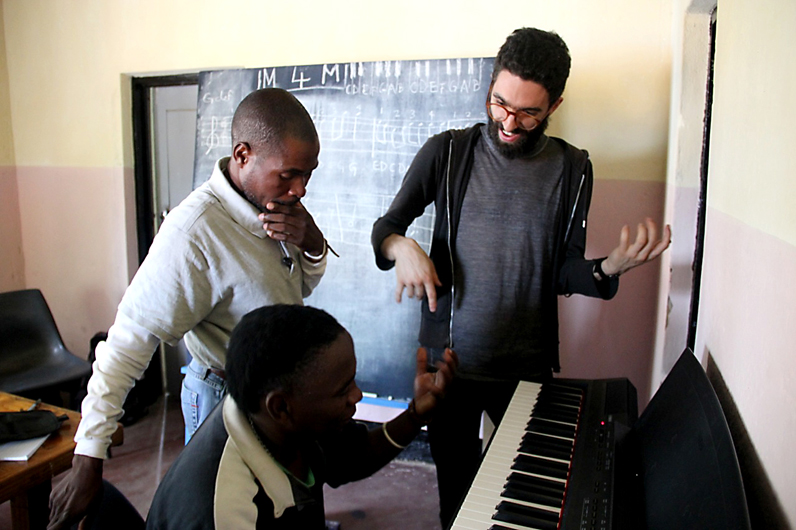
Music: A Shared Experience
It was a scene familiar to most of us—a class of young children gathered onstage for a musical performance. For Nicolas Galvan, though, the ordinary scene had struck a chord.
“No matter where you are in the world, all kids respond in a similar way to music,” says Galvan, a tenor saxophonist and junior at Eugene Lang College and The New School for Jazz and Contemporary Music. “Music is the great equalizer, the forefront of racial, economic, and cultural integration. It seems such an obvious idea, but at that moment, listening to those kids sing with such enthusiasm, the truth of that, given the situation I was in, really struck me.”

Students perform local songs during an after-school program with the organization Komai in Malawi. Photo courtesy of Nicolas Galvan.
That situation was Galvan’s stint last month as a volunteer educator at an after-school program in Luchenza, Malawi, run by Komai, an organization whose newest project teaches children the fundamentals of music notation and ways to apply that knowledge to traditional songs. The New School participates in many educational outreach programs; what makes this one different is that Galvan was enjoying the concert from Komai’s headquarters in Malawi.
“No matter where you are in the world, all kids respond in a similar way to music,” says Galvan, a tenor saxophonist and junior at Eugene Lang College and The New School for Jazz and Contemporary Music. “Music is the great equalizer, the forefront of racial, economic, and cultural integration.”
How did a New School jazz student find himself (along with a classmate, drummer Derek Baron) in a remote town in the southeastern African nation? It started a year ago with Jazz professor Chris Stover. Stover, a composer and theorist with a long-standing interest in ethnomusicology, traveled to Malawi with Komai’s director, Amelia Reid, with an eye toward getting New School students involved. After a competitive application process, Galvan and Baron were chosen to spend two weeks with the organization providing basic music lessons and teacher training.
“Music is a fundamental part of our education and development,” says Stover. “We want to give these kids, who struggle with so much in their day-to-day lives, an outlet for creative expression. Singing and dancing are essential to learning, but we also just want to provide them space to be kids for an afternoon.”
Komai’s main focus is this music program, which is supported in part by its magazine and sustainable fashion clothing line. Now in its second year, the music program trains local performers and educators in Western techniques and teaching methods. These teachers incorporate the lessons into an after-school program for nearly 100 children aged seven to 16.
The program also focuses on preserving endangered musical cultures, something that greatly intrigues Stover as he contemplates the ongoing relationship between Komai and The New School. “Music is a way to preserve cultural knowledge and entrench history,” says Stover, “and there’s a fear among scholars and practitioners that local musical culture is drifting away.” To counteract this trend in Malawi, Stover is putting together a plan in which New School students can assist with an ongoing archival project, digitizing and editing a vast collection of field recordings from around the country. A longer residency, like the one Galvan and Baron participated in, is also in the works. “As soon as they returned, both students remarked that two weeks was much too short a time to make a real impact not only in the lives of the children and teachers in Malawi but also in their own professional development,” says Stover. “I’m hoping we can create a partnership that works with our students’ schedules so that we can have them over there for perhaps a summer or a semester.” Galvan, who has been awarded a $3,000 grant from the University Student Senate for musical equipment and supplies, is eager for an opportunity to return.
“It really was a life-changing experience for me,” he says. “I now have this global perspective and feel like an agent of social change. Seeing people benefit from my knowledge and ambition has broadened my understanding and abilities.” His playing has also taken a new turn. “I was told to be ‘prepared to be unprepared’ before I left. I didn’t think the local music would affect my own style so much. I’ve learned to go back to basic rhythms and play more simply, really experiencing the music. I didn’t expect that.”
Learn more about Komai by visiting the organization’s website at komai.co.